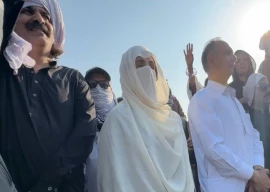
Police and ministry officials said the suicide bombing in the centre of the northern city, close to its famous Blue Mosque, also injured 11 people and shattered shop windows.
"He was a suicide attacker. The target is unknown. Investigations continue," said interior ministry spokesman Siddiq Siddiqi, who gave the toll and said that all the casualties were civilians.
Bicycle parts were scattered across the ground, which was covered in glass shards and spatters of blood.
The bombing in the heart of one of the country's most secure cities will fuel fears that a transition from foreign forces to Afghan control, taking place in seven areas this week, is happening too quickly.
Violence is at a record high in the insurgency against the Western-backed government and 150,000 US-led foreign troops.
US and Afghan officials are trying to reach out to insurgents to broker a political solution as NATO-led troops begin a gradual withdrawal designed to recall all its combat troops by the end of 2014.
Mazar had been thrown into turmoil in April when demonstrators, protesting at the burning of a Koran by a US pastor, attacked a UN compound and killed seven foreign staff.
At the time, the killings raised fears that plans were being rushed for Afghans to take control of security from German troops, who lead coalition efforts in the city.
In the volatile south of Afghanistan, focus of some 33,000 American "surge" troops sent last year to quell the insurgency, another transition ceremony took place on Wednesday, with the main city of restive Helmand province handed over.
The government house in the city of Lashkar Gar, where mostly British troops are based, hosted the ceremony attended by the Afghan defence minister and other senior officials.
In the neighbouring province of Kandahar -- birthplace of the Taliban and the scene of last week's shock assassination of the Afghan president's brother, a gunbattle broke out early Wednesday, leaving five dead.
The firefight, triggered by a raid mounted by Afghan police on a house where at least two insurgents were holed up, left both militants and three policemen dead.
One of the insurgents killed in the raid was described by interior ministry spokesman Siddiq Siddiqi as a well-known Taliban commander. He said the district's police chief was also among the dead.
Meanwhile, the Taliban on Wednesday accused the United States of hacking their mobile phones after a text message purportedly from one of the militants' spokesmen said their reclusive leader Mullah Omar was dead.
Taliban spokesman Zabihullah Mujahid said that Omar was alive, and that the text message and an email also seemingly from the Taliban saying he had died from a heart condition were false.
"We strongly reject this claim. We are not aware of such news. Americans have hacked our mobile phones with advanced technology and sent the message to the media," said Mujahid.
Omar, the spiritual leader of the insurgency, presided over the Taliban's brief regime in Kabul which was toppled by the US for refusing to give up Al-Qaeda leader Osama bin Laden after the 9/11 attacks.
Abdul Wahab Salih, the deputy chief of intelligence for Kandahar city, birthplace of the Taliban, said the National Directorate for Security (NDS) had no reports of the Taliban leader's death.
The reclusive Omar has not appeared in public since 2001.
In May, shortly after US special forces killed bin Laden in Pakistan, the NDS intelligence agency said he had disappeared from his suspected hideout in Pakistan.
COMMENTS (1)
Comments are moderated and generally will be posted if they are on-topic and not abusive.
For more information, please see our Comments FAQ



1732626034-0/BeFunky-collage-(92)1732626034-0-165x106.webp)



1732621030-0/Express-Tribune-(7)1732621030-0-270x192.webp)
1732622842-0/Express-Tribune-(9)1732622842-0-270x192.webp)

1725254039-0/Untitled-design-(24)1725254039-0-270x192.webp)






Is there any reason for US and NATO to occupy Afghanistan? Is there any reason to plan to attack Iran? Is there any reason to have war as a policy?
Do not the human being enter into the calculations? OR they are merely pawns to be disposed as and when necessary? Isn't a life of a Marine precious? OR a life any human being for that matter?